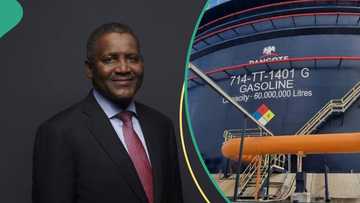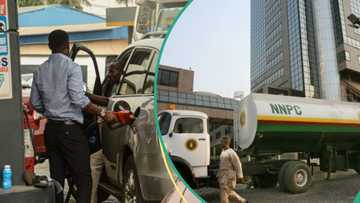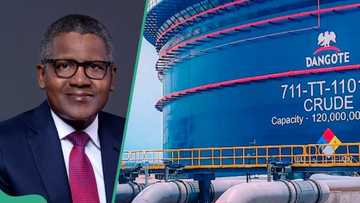NNPC Ignores Dangote Refinery to Sell Nigeria’s Crude for Petrol With Others
- Nigeria continues to trade 450,000 barrels of crude oil per day (bpd) for about a million metric tons (MT) of petrol
- According to Bello Rabiu, a former COO at the NNPC, the petrol was supplied between a few foreign traders and the NNPC
- Rabiu contended in his address that the federal government's claim to have eliminated the fuel subsidy was insufficient proof of deregulation
Legit.ng journalist Zainab Iwayemi has over 3-year-experience covering the Economy, Technology, and Capital Market.
Nigeria still exchanges 450,000 barrels per day (bpd) of crude oil for roughly 1 million metric tons (MT) of petrol, or 1.341 billion litres, through the state oil company.
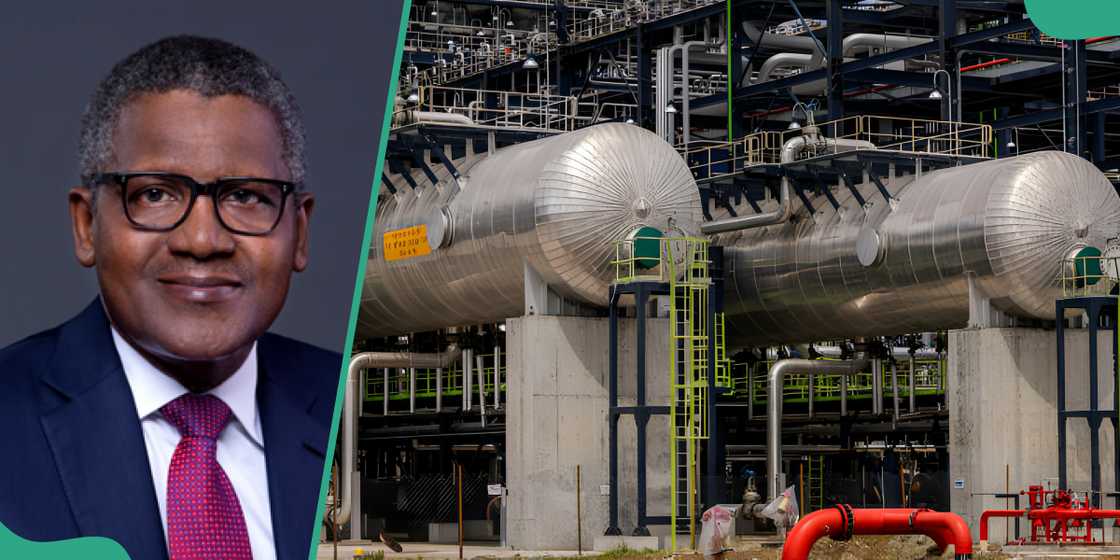
Source: Getty Images
This was disclosed by Bello Rabiu, a former Chief Operating Officer in charge of the Upstream Business Unit at the defunct Nigerian National Petroleum Company Limited (NNPC).
The final products, according to Rabiu, were supplied between the NNPC, Nigeria's sole petrol importer, and certain foreign traders through the Direct Sale Direct Purchase (DSDP) arrangement, often known as crude swap.
This comes after petroleum downstream companies affiliated with the Major Energy Marketers Association of Nigeria (MEMAN) disclosed that the current landing cost of petrol into the country is N1,117 per litre.
What experts said
Former NNPC official Abiodun Adedipe, the founder and chief consultant of B. Adedipe Associates Limited, suggested that the main source of frustration in the Nigerian gasoline supply value chain was the unavailability of feedstock for indegenous refineries, particularly the 650,000 bpd Dangote Refinery, which can meet domestic gasoline demand.
The presenter on a MEMAN webinar argued that fair and competitive petroleum downstream markets are necessary to sustain reasonable prices and product availability.s
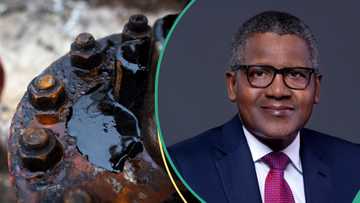
Read also
“We cannot rely on one refinery to feed the nation”: NMDPA replies Dangote over non-supply of crude
In his speech, Rabiu argued that the federal government's assertion that it had abolished the fuel subsidy was insufficient evidence of deregulation.
In order to guarantee that consumers may buy things at fair prices, he says, it also requires the creation of a competitive market environment.
Rabiu, who is now an independent consultant, condemned the importation of petrol solely by NNPC in a ThisDay report, saying, “This is a monopoly, which is against deregulation procedures. “
He said,
“With consumption capacity estimated at one million MT (1.341 billion litres) currently being supplied through DSDP importation programme of NNPC, whereby local and international traders are contracted to lift Nigerian crude oil owned by NNPCL and deliver petroleum products in ex-Lagos.
“This remains the only supply source of PMS in the Nigerian market due to the inability of other players to secure forex for direct importation. Thus, NNPC is effectively the only supplier of PMS in Nigeria today.
“Being the only supplier and importer of PMS in Nigeria, NNPC is currently the determinant of PMS price as other players are only adding their margins to arrive at pump price depending on location.”
He, therefore, insisted on reviewing the deregulation policy's current institutional structure and business plan, which have allowed one large corporation to import petrol and determine the price at which it is sold nationwide.
Rabiu claimed that this was against the Petroleum Industry Act (PIA) 2021, which stipulates that to deliver goods at the lowest possible cost at the pump, multiple parties must work together in an open, competitive environment with a variety of supply sources from domestic and foreign refineries on an even playing field.
Filling stations may adjust fuel pumps
Legit.ng reported that as of Tuesday, July 16, 2024, the price that marketers must pay to import one litre of petroleum from refineries overseas has increased to N1,117/liter.
The Major Energies Marketers Association of Nigeria (MEMAN) revealed the new fuel landing cost to press on Wednesday, July 17.
In Nigeria, product costs, dealer and insurance margin, shipping costs, government agency fees, finance and banking fees, and storage fees are the main elements that make up the cost of landing gasoline.
PAY ATTENTION: Unlock the best of Legit.ng on Pinterest! Subscribe now and get your daily inspiration!
Source: Legit.ng

